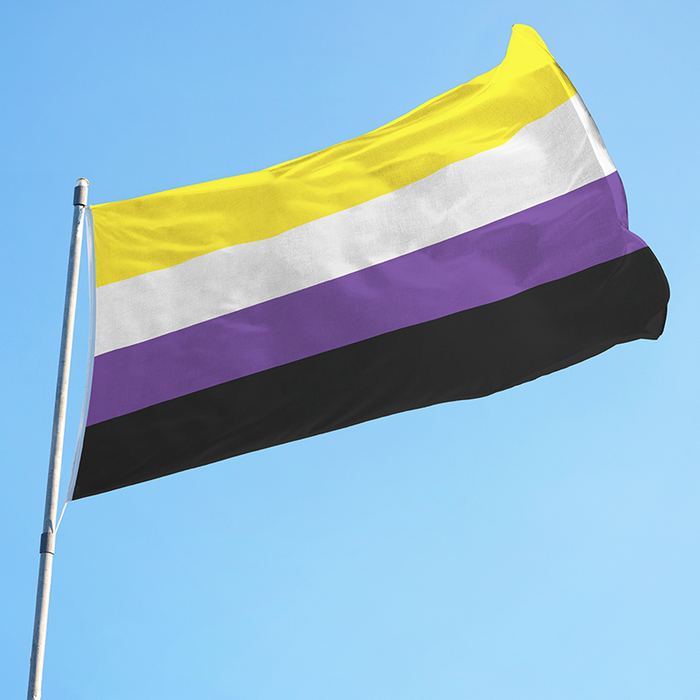The new personal pronoun, grammar and society.
Translation: Victoria Bakshina
In the last few years, the creation of queer-friendly words has become prominent in the society. Words that encompass definitions of the inner and outer self-consciousness of all groups in society are the key to ensuring that our mother tongue remains functional. The queer-friendly words, neologisms that encompass definitions of queer people, have been a major part of the queer people’s rights battle.
Photo: Contributed
One of the most common queer-friendly words is, without a doubt, the personal pronoun hán that refers to non-binary people, e.g., people who do not identify as either male or female, or who identify in other ways outside of the male/female gender dichotomy.
Eiríkur Rögnvaldsson is professor emeritus of linguistics at the University of Iceland and the author of many books on Icelandic grammar. The Student Paper spoke with him about the emergence of the new personal pronoun hán, since this change in the language is unconventional, as new word constructions rarely appear in closed word classes. The nouns are e.g., an open word class that is constantly adding new words in accordance with the needs of modern society. Pronouns, however, are a closed word class. There are few pronouns and in order to change them or add new words, a mutual, social effort must take place.
Eiríkur first came into contact with the new pronoun in 2013-2014 and admits to having some doubts at first.
I was a bit stuck in the perception that pronouns were a closed word class, and that it was not possible to simply add pronouns to the language. In 2015, however, I was invited to be a jury member in a neologism competition of the National Queer Association of Iceland - Samtökin '78. There were all kinds of people with different sexualities and gender identities that I simply had no idea existed.
On Icelandic Language Day in 2015, the Student Association Mímir, the Association of students in Icelandic studies, general linguistics, and sign language, held an event where Samtökin '78 discussed the importance of queer vocabulary, and Eiríkur says that this meeting has finally changed his attitude.
María Helga Gunnarsdóttir, the previous chairman of Samtökin '78, and Alda Villiljós, the wordsmith of the word hán, quickly convinced us. Where does someone stand if they themselves and the people around them cannot talk about them in their native language, if there are no words that apply to them – that is a great exclusion and marginalization.
In 2016, Eiríkur made the personal pronoun hán a part of his curriculum in inflectional morphology, and he was involved in a lively public debate on the grammatical correctness of making such drastic changes to the language.
Some have argued that, firstly, it is not possible to add another personal pronoun, and secondly, it is not necessary – we have the personal pronoun það , and some people think it should be enough. There are some people who find it derogatory, and there’s no denying that the pronoun það is all about the inanimate objects in our minds. In fact, hán is just a neuter personal pronoun that we use to define a person. Það and hán have different functions.
Photo: gpride.org
Some have also pointed out that there is no demonstrative pronoun corresponding to neuter gender, but in the masculine we use sá and in feminine- sú. That's why you can't add a third pronoun to the language. However, Eiríkur points out that such a dramatic change in the language does not have to happen all at once.
This is a bit typical for the argument being made in this regard, that we can't change this because it won't work in this and other context, but I think it would be a mistake to demand that everything be solved at once – like saying that we can't accept all refugees who want to come here and, therefore, we shouldn't accept any. It is true that there is no gender-neutral demonstrative pronoun yet, but until then I have found a nice and easy-to-use solution: hán (sá – sú – hán). The right words are created over time and naturally come from people who belong to this particular group of society, because it is of course about people having a say in the way they are being addressed and talked about.
Some people think that a major change like this is a distortion of the Icelandic language, but Eiríkur says that despite the resistance that exists, hán and more queer-friendly words will become a language norm over time.
As with everything else in life, it's a matter of getting over a certain hurdle. This is just like the recognition of homosexuality in its time, when more people came out of the closet and a declared homosexual person was in most groups of friends and families, people's attitudes changed, because then they started recognizing these concepts firsthand.
For those who are of the opinion that the matter should not be handled manually, Eiríkur says that if a choice must be made between language users and the language system, the language will deviate.
Some people think that the language should not change at all, while others believe that the language should be allowed to evolve without people being consciously involved in it. But the truth is, it's always changing and developing and we're always exchanging opinions on that. After all, it is vital for the language to serve society as a whole, and I cannot see the addition to the language as any sabotage. The justification for speaking Icelandic must be that it covers all groups of the nation. While of course it is important to protect our language at all levels, language users will always be more competent than the language itself. If Icelandic is not enough to serve all groups of the language users, then something needs to change.


